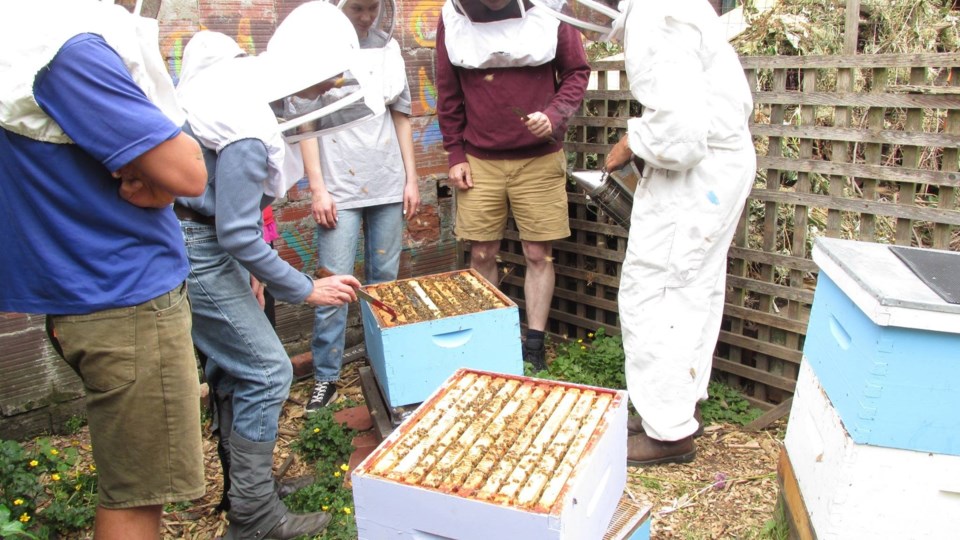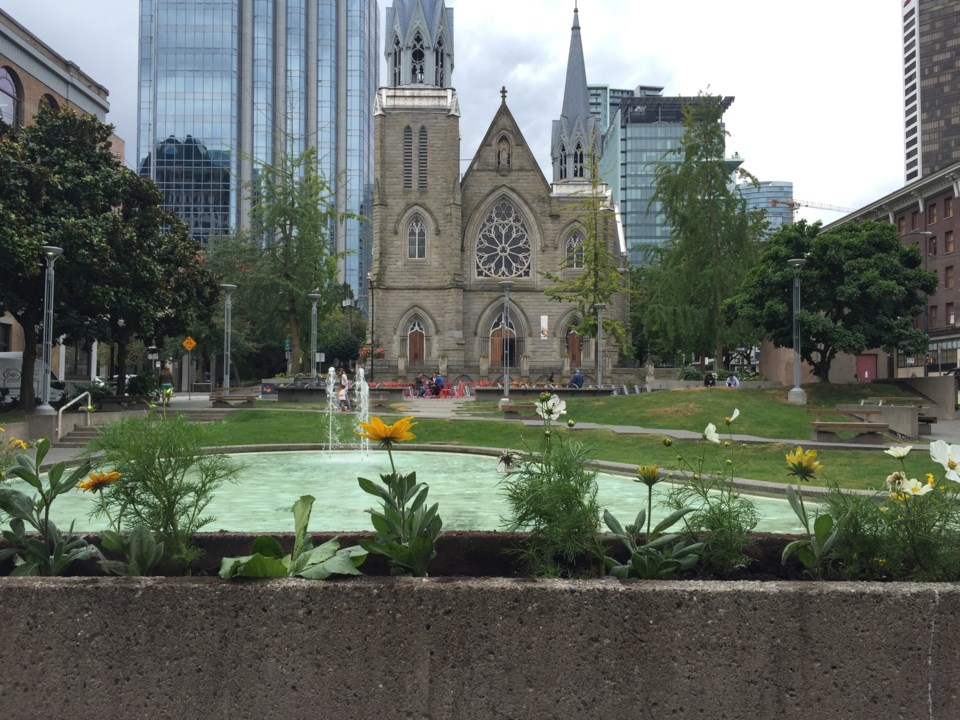Maybe you’ve had lunch in Cathedral Square. You’ve likely at least walked past it if you’ve lived in Vancouver for any length of time. You probably wouldn’t want to hang out there at night. Cathedral Square Park is an odd patch of greenery in the heart of the downtown Vancouver. It’s directly across the street from the Holy Rosary Cathedral at the corner of Richards and Dunsmuir.
The City’s website describes this urban park as “invigorating yet graceful.” In its current state, I’d actually describe it as “dated and dirty.” The good news is the park is about to receive a very creative, interactive, and nature-based upgrade.
More on that in a moment; but first, a bit about this curious little park, the centerpiece of which is a large, shallow, discoloured fountain/pool ringed by benches and ginkgo trees. The pool is backed by several tiers of concrete and pillars that look almost like staging, topped by a giant faded blue lattice canopy.
If it sounds very 1980s, it’s because it was all built over North America’s first-ever underground substation. It’s one of three substations in downtown Vancouver that provides us with electricity. The Cathedral Square substation was put in place in 1984 and has been humming ever since.
When I walked through the park last week, it was strewn with garbage. One person was quickly rooting through a sodden suitcase, while two others were screaming blue bloody murder at each other, oblivious to life around them. Not exactly a relaxing atmosphere. The park seemed in need of a lot of love.
Enter the bees. The Vancouver Park Board, the Downtown Business Improvement Association, and the non-profit society Hives for Humanity are partnering on an initiative to bring honeybees, a pollinator garden, and a series of ongoing pollinator and garden workshops to Cathedral Square very soon.

The plan is to install two large beehives enclosed by fencing, as well as plants and flowers that benefit bees and other pollinators in the existing “garden” in the north part of the Square (the concrete staging area). The hope is that by this summer, you'll be able to sample Cathedral Square honey on your lunch break.
Sarah Common is the co-founder and chief community officer of Hives for Humanity, whose goal is to “enhance community through apiary.” She welcomes the challenge of bringing bees to a neglected urban landscape.
“I think it was acknowledged that Cathedral Square was falling out of care, and that there was some negative behavior from some park users. There are people living at risk in the park, and their behavior is rooted in complex social problems,” says Common. “The park didn’t seem to have any unified community or really anything to invite people to use it. We hope our hives will help to engage the space in a calm and respectful way for everyone.”
Common says that indeed everyone is welcome to volunteer to help maintain the hives and work directly with bees. “Beekeeping is an extremely positive, therapeutic and meditative experience,” Common extols. “There’s a real magic to it, a mesmerizing joy”.
This will be Hives for Humanity’s first park apiary, and, yes, there will be thousands upon thousands of bees buzzing around, but Common is quick to point out that there is no undue risk to public safety. “We traditionally work with gentle bees,” she states. “Wherever there are flowers, there’s already bees. And we’re careful with risk assessment. The beehives will be in an enclosure. No one will be able to accidently bump into the hives.”
This Friday May 19, as part of Hives for Humanity’s ongoing “Lunch and Learn” series, all are welcome to take part in a public workshop entitled “Caring For Pollinators in the Park,” from noon to 1pm in Cathedral Square. All equipment is provided, including the honey.
Let’s hope the bees will bring a refreshing buzz to a public space that has been forlorn for far too long.



